Projects' reports by Tomaselli Alexandra
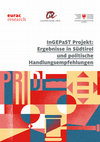
Das Projekt „Intersectionality of Gender and Ethnicity in Socioeconomic Participation in Südtirol... more Das Projekt „Intersectionality of Gender and Ethnicity in Socioeconomic Participation in Südtirol/Alto Adige and Catalonia in Post-Pandemic Times – InGEPaST“ untersuchte die Intersektionalität von Geschlecht und Ethnizität bei der sozioökonomischen Teilhabe in den Gebieten Südtirol und Katalonien. Diese Gebiete haben ähnliche Autonomiesysteme und einige große gesellschaftliche Herausforderungen. Ziel war es, innovative Lösungen zur Verbesserung des Zugangs zu Arbeit, Bildung und öffentlichen und sozialen Dienstleistungen für Frauen und LGBTQIA+ (Lesben, Schwule, Bisexuelle, Transsexuelle/Gender, Queer, Intersexuelle, Asexuelle, „Gender Diverse“ und „Questioning“) anzubieten. Dieser Bericht veröffentlicht die Ergebnisse zur Situation in Südtirol.
Das Projekt „ Intersektionalität von Gender und Ethnizität in der sozioökonomischen Partizipation in Südtirol und Katalonien in Zeiten nach der Pandemie “ wird von der Autonomen Provinz Bozen-Südtirol – Abteilung für Innovation, Forschung, Universität und Museen finanziert.
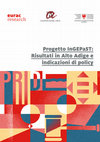
L’obiettivo del progetto “Intersezionalità di Genere ed Etnicità nella Partecipazione Socioeconom... more L’obiettivo del progetto “Intersezionalità di Genere ed Etnicità nella Partecipazione Socioeconomica in Südtirol/Alto Adige e Catalogna in tempi post-pandemici - InGEPaST” è stato quello di esplorare l’intersezione di genere ed etnicità nella partecipazione socioeconomica in due realtà come l’Alto Adige e la Catalogna, che condividono simili sistemi di autonomia e alcune grandi sfide della società, al fine di offrire soluzioni innovative per potenziare l’accesso al lavoro, all’educazione e ai servizi pubblici e sociali di donne e persone LGBTQIA+ (lesbiche, gay, bisessuali, trans-sessuali/gender, queer, intersessuali, asessuali, “gender diverse” e “questioning”) in uno scenario post-pandemico. Nell’ambito di questo progetto, il presente rapporto si propone di rendere pubblici i risultati sulla realtà altoatesina.
Il progetto “Intersezionalità di Genere ed Etnicità nella Partecipazione Socioeconomica in Südtirol /Alto Adige e Catalogna in tempi post-pandemici (InGEPaST)” è finanziato dalla Provincia Autonoma di Bolzano-Alto Adige – Ripartizione Innovazione, Ricerca, Università e Musei.
This report describes the process of the policies’ analysis of the InGEPaST project and the resul... more This report describes the process of the policies’ analysis of the InGEPaST project and the results of two datasets: primary data stemming from empirical research carried out with policy-experts in South Tyrol and Catalonia between January and March 2023 (second part of WP2); secondary data that include those South Tyrolean and Catalan laws, policies and action plans that deal with or otherwise affect the socioeconomic participation of women and LGBTIAQ+ individuals at local level (WP3).
The project “The Intersection of Gender and Ethnicity in Socioeconomic Participation in South Tyrol and Catalonia in Post-Pandemic Times (InGEPaST)” is funded by the Autonomous Province of Bolzano-South Tyrol – Innovation, Research, University and Museums Department (Provincia Autonoma di Bolzano-Alto Adige – Ripartizione Innovazione, Ricerca, Università e Musei).
Este informe tiene el objetivo de hacer públicos los resultados del proyecto «Interseccionalidad ... more Este informe tiene el objetivo de hacer públicos los resultados del proyecto «Interseccionalidad de Género y Etnicidad en la Participación Socioeconómica en Südtirol/Alto Adige y Cataluña en tiempos posteriores a la pandemia – InGEPaST» sobre la realidad catalana.
El proyecto «Interseccionalidad de Género y Etnicidad en la Participación Socioeconómica en Südtirol/Alto Adige y Cataluña en tiempos posteriores a la pandemia – InGEPaST» está financiado por la División de Innovación, Investigación, Universidad y Museos de la Provincia Autónoma de Bolzano-Alto Adige.
Aquest informe té l'objectiu de fer públics els resultats sobre la realitat catalana del projecte... more Aquest informe té l'objectiu de fer públics els resultats sobre la realitat catalana del projecte « Interseccionalitat de Gènere i Etnicitat en la Participació Socioeconòmica al Südtirol /Tirol del Sud i Catalunya en temps postpandèmia (InGEPaST)» .
El projecte “Interseccionalitat de Gènere i Etnicitat en la Participació Socioeconòmica en Südtirol /Tirol del Sud i Catalunya en temps post-pandèmics (InGEPaST)” és finançat per la Província Autònoma de Bozen-Tirol del Sud – Divisió de repartiment d’innovació, Recerca, Universitat i Museus.
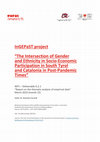
“The Intersection of Gender and Ethnicity in Socio-Economic Participation in South Tyrol and Catalonia in Post-Pandemic Times”, 2023
This report has a fourfold aim:
– first, it describes the process of the empirical research (WP2... more This report has a fourfold aim:
– first, it describes the process of the empirical research (WP2) that was carried out with CSOs in South Tyrol and Catalonia between April 2022 (month 4) and March 2023 (month 15) of the InGEPaST project;
– second, it presents a synthetic and preliminary thematic analysis of the primary data stemming from such empirical research;
– third, it provides the data analysis and results that are necessary to reply to the first of the abovementioned sub-research question by identifying which are the main social drivers and external factors that influence the intersection of gender and ethnicity in the socioeconomic participation of women and LGBTIAQ+ individuals in South Tyrol and Catalonia and how do they correlate, operate and differentiate;
– fourth, it supplies the data results that will serve to elaborate the InGEPaST project scientific articles that will be prepared following this deliverable (milestone M.4.4: submission of 2 scientific articles to peer-reviewed journals due for month 24).
The Deliverable D.1.2 contains the project's fine-tuned methodology, that is, the project RQs, th... more The Deliverable D.1.2 contains the project's fine-tuned methodology, that is, the project RQs, the methodological approach and its foundational elements, the project design, the research techniques and sampling strategy, and ethical issues.
The project “The Intersection of Gender and Ethnicity in Socioeconomic Participation in South Tyrol and Catalonia in Post-Pandemic Times (InGEPaST)” is funded by the Autonomous Province of Bolzano-South Tyrol – Innovation, Research, University and Museums Department (Provincia Autonoma di Bolzano-Alto Adige – Ripartizione Innovazione, Ricerca, Università e Musei).
Books by Tomaselli Alexandra
The Prior Consultation of Indigenous Peoples in Latin America. Inside the Implementation Gap (Claire Wright & Alexandra Tomaselli, Eds.)
Routledge, 2019

Justicia y formas de participación indígena / Alexandra Tomaselli, Silvia Ordóñez, Claire Wright (eds.)
Este número de los Cuadernos Deusto de Derechos Humanos es el resultado de la tercera edición de ... more Este número de los Cuadernos Deusto de Derechos Humanos es el resultado de la tercera edición de la jornada de investigadores en asuntos indígenas de la «Red EMPI – Encuentros Multidisciplinares sobre Pueblos Indígenas», realizada en Sevilla en los días 5-6 de junio de 2012.
Queremos dar espacio a dos cuestiones complejas y poco conocidas: primero, el tema de la justicia de los pueblos indígenas, en términos tanto del pluralismo jurídico como de cómo los medios de la justicia «formal» pueden (o no) dar espacio a las demandas de los pueblos indígenas; y segundo, el tema de las formas de participación de los pueblos indígenas más allá de las formas políticas, como puede ser a través de un proceso de consulta, sino también de medios de gestión territorial a través de los cuales los pueblos indígenas se vuelven verdaderos actores de su propio desarrollo.
Edited special issues of Peer-Reviewed Journals by Tomaselli Alexandra
The Dynamic Relationship Between Human Rights Law and Indigenous Peoples. Theoretical debate and cases studies in Africa, India and Europe, Special Feature of IIPJ edited by Claire Wright and Alexandra Tomaselli
International Indigenous Policy Journal (IIPJ), Volume 5, Issue 4, 2014, Dec 2014
Iberoamericana. Nordic Journal of Latin American and Caribbean Studies, Vol. XLIII, 1-2, 2013, 2013
This issue entitled “The ‘new’ role of indigenous peoples in South American societies and their p... more This issue entitled “The ‘new’ role of indigenous peoples in South American societies and their political influence. Progress and Challenges” takes its name from the homonymous panel which we had the honor to coordinate at the Sixth Conference NOLAN (Nordic Latin American Research Network) “Latin America in Movement: Power, Spaces and Subjectivities” in Stockholm on 26-28 April 2012.
Scientific articles & book chapters by Tomaselli Alexandra

Changing Borders and Challenging Belonging Policy Change and Private Experience by Georg Grote and Andrea Carlà (eds) , 2024
This chapter challenges belonging and borders from a decolonial perspective by focusing on the im... more This chapter challenges belonging and borders from a decolonial perspective by focusing on the impact of the creation of states on the Indigenous
Sámi people in the three Nordic States (Norway, Sweden and Finland)
and the Russian Federation. In this frame, it aligns with the arguments
of this volume’s editors that not only borders and identities are socially
constructed concepts but also human societies are much more complex
than the idea, or the ideal, of a nation-state, being rather characterized by
diversity and multiple identities. This, however, does not mean that borders, in the legal and political sense, have not affected or do not impact
peoples’ daily lives. This is particularly evident in the case of Indigenous
Peoples, such as the Sámi, who live across national frontiers, and, as the
volume editors argue, enter those power dynamics and processes of inclusion and exclusion that are present in all types of borders.
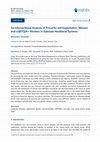
The intersection of gender and ethnicity or race lies at the root of structural discrimination an... more The intersection of gender and ethnicity or race lies at the root of structural discrimination and racist practices for accessing the labor market and in the workplace. This discrimination is particularly evident for women and LGBTQIA+ individuals who either belong to ethnic minorities or are migrants. However, numerous other social drivers (e.g., age, class, origins) and external factors (e.g., prejudices, gender-based violence) further hinder their participation in the work domain and their attainment of fair labor conditions. This article explores how gender, ethnicity, and race intersect and operate with other conditions and factors to perpetuate the precarity and exploitation of women and LGBTQIA+ individuals who find themselves at the nexus of varied intersectional axes. The discussion centers around two neoliberal substate units in the Global North (South Tyrol, in Italy, and Catalonia, Spain) that register low unemployment rates and high rates of migration and that are home to historical, linguistic, and ethnic minorities. This empirical article provides for an informed debate on the lived experience of precarity and exploitation of women and LGBTQIA+ workers, and an analysis of how neoliberal substate units' labor and gender policies could be reformed.
Donath, P.B., Heger, A., Malkmus, M., Bayrak, O. (eds.) Der Schutz des Individuums durch das Recht. Springer, 2023
In light of what Professor Rainer Hofmann has taught to the academic and the international commun... more In light of what Professor Rainer Hofmann has taught to the academic and the international communities on the (effective) political participation of (national) minorities, this chapter aims to offer a concise overview on how human rights law protects and tries to guarantee the political participation of Indigenous women. After briefly introducing what Indigenous political participation implies under international law, this chapter will look at women rights’ standards and to the latest developments vis-à-vis Indigenous women (and girls’) rights regarding their participation in the political sphere. It will then offer some concluding remarks.
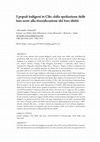
I popoli indigeni e i loro diritti in America Latina. Dinamiche continentali, scenari nazionali, 2023
In Cile vivono almeno dieci popoli indigeni i quali, dopo aver subito una considerevole spoliazio... more In Cile vivono almeno dieci popoli indigeni i quali, dopo aver subito una considerevole spoliazione delle loro terre nel corso dei secoli, sono stati riconosciuti in base alla cd. Legge Indigena (Ley Indígena) n. 19.253 del 1993 (e successive modifiche) come le seguenti «etnie» (etnias): Aimara, Chango, Colla, Diaguita, Kawashkar o Alacalufe, Likan Antai o Atacameños, Mapuche, Quechua, Rapa Nui e Yámana o Yagán. L’ultimo censimento del 2017 ha registrato un sensibile aumento di coloro che si auto-identificano come indigeni, passando dall’11,11% del 2012 al 12,8% della popolazione totale cilena.
Nonostante ciò, né la Legge Indigena e altre leggi in materia, né la tutela offerta dagli strumenti internazionali ratificati dal Cile vengono applicati in modo soddisfacente generando molta frustrazione nonché ingiustizie che hanno dato origine a ricorsi presso le Corti d’Appello e la Corte Suprema cilene. Inoltre, il Cile è uno dei pochissimi paesi latinoamericani che non ha ancora riconosciuto costituzionalmente i propri popoli indigeni, nonostante i diversi tentativi sin dal ritorno della democrazia e l’ondata delle riforme latinoamericane degli anni Novanta. Molte erano, quindi, le aspettative verso la riforma della Costituzione a cura dell’Assemblea Costituente eletta dai cileni e che riservava 17 seggi (su 155) ai rappresentanti indigeni. Il progetto di Costituzione, che conteneva alcune disposizioni in materia di diritti dei popoli indigeni, è stato però bocciato al referendum del 4 settembre 2022.
In tale contesto, il presente saggio intende fornire una panoramica del rapporto fra i popoli indigeni e le istituzioni del Cile di ieri e di oggi, analizzando la storia della sottrazione delle loro terre e l’attuale spettro dei diritti loro riconosciuti dalla legislazione nazionale – dall’identità culturale alla terra – nonché i fattori che impediscono la loro efficace implementazione, dando anche uno sguardo alle recenti sentenze delle corti cilene e all’ennesimo mancato riconoscimento costituzionale dei loro diritti.
E. Chile (YIEL Vol. 31 on year 2020)
Yearbook of International Environmental Law, 2020
As elsewhere, the year was marked by the COVID-19 pandemic, which sadly caused the loss of over 2... more As elsewhere, the year was marked by the COVID-19 pandemic, which sadly caused the loss of over 26,000 people in Chile by the time of this writing (April 2021). Notwithstanding the restrictions and the consequent delays, the referendum on whether amending the (still that of Pinochet) Constitution of 1980 was held on 25 October. An overwhelming majority (78.2 percent) voted in favour of such a reform and for a mixed Constituent Assembly—that is, a commission formed by representatives that were to be elected on 11 April, but will be voted on in 2021 (15–16 May). As mentioned in the previous volume (see YIEL, volume 30), the constitutional reform may also include amendments to the current system of environmental protection.

Land, Consultation and Participation Rights of Indigenous Peoples in the Jurisprudence of the Inter-American Court of Human Rights: The Cases of Kichwa Indigenous People of Sarayaku v. Ecuador and Kaliña and Lokono Peoples v. Suriname
Bertus de Villiers, Joseph Marko, Francesco Palermo, and Sergiu Constantin (eds.), Litigating the Rights of Minorities and Indigenous Peoples in Domestic and International Courts, Brill, Leiden, 2021
The role of the Inter-American Commission of Human Rights and the Inter-American Court of Human R... more The role of the Inter-American Commission of Human Rights and the Inter-American Court of Human Rights (hereinafter, the Commission and the Court, respectively) in assessing the interpretation and advancing the rights of Indigenous Peoples in the context of the Americas, and especially Latin America, is absolutely undeniable. The landmark decisions of these bodies have set what has been defined by the Court itself as an “evolutionary interpretation” of human rights, which has been firstly conceived and applied in a case of violation of land rights of Indigenous Peoples, i.e. Comunidad Mayagna (Sumo) Awas Tingni v. Nicaragua of 2001 (Inter-American Court of Human Rights 2001, para.148). In the words of the Court, “human rights treaties are living instruments, the interpretation of which must evolve over time and reflect current living conditions” (Inter-American Court of Human Rights 2012, para. 161). In particular, the American Declaration on the Rights and Duties of Man of 1948 and the American Convention on Human Rights – Pact of San José (ACHR) of 1969 must be interpreted extensively to protect the rights of Indigenous Peoples, notwithstanding the absence of any expressive norm or provision on Indigenous rights until the adoption of the American Declaration on the Rights of Indigenous Peoples in 2016, which, however, is a non-binding document.
In this frame, this chapter aims to explore both how the Commission and the Court have analysed the alleged violations of Indigenous rights and how they have developed their legal reasonings in two recent and pivotal cases, namely the Case of the Kichwa Indigenous People of Sarayaku v. Ecuador (Inter-American Court of Human Rights 2012) and the Case of the Kaliña and Lokono Peoples v. Suriname (Inter-American Court of Human Rights 2015).
E. Chile (YIEL Vol. 30 on year 2019)
Yearbook of International Environmental Law (OUP), 2021
This year has been a crucial one for Chile. The protests that erupted in October once again point... more This year has been a crucial one for Chile. The protests that erupted in October once again pointed to the high level of socio-economic inequality in this country. The protests eventually led to the announcement and organization of a referendum to finally reform the 1980 Chilean Constitution, which was adopted under Pinochet’s dictatorship and only poorly reformed afterward. Although the referendum (planned for 26 April 2020) may be postponed due to the COVID-19 outbreak, its realization may set in motion the momentum needed to rethink the system of environmental protection.
The Prior Consultation of Indigenous Peoples in Latin America. Inside the Implementation Gap., 2019
The aim of this chapter is to carry out a thorough, comparative analysis of the implementation ga... more The aim of this chapter is to carry out a thorough, comparative analysis of the implementation gap that exists between international standards and domestic practice related Indigenous Peoples' right to prior consultation and their Free, Prior, and Informed Consent (FPIC). More specifically, this chapter: analyses significant experiences in different countries throughout Latin America and the contrasting case of Canada; provides answers to key research questions on prior consultation and FPIC; and highlights implications for scholars and practitioners alike. Finally, it makes a critique of the "implementation gap" approach and proposes the perspective of "Indigenous empowerment" as a useful alternative.
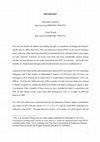
The Prior Consultation of Indigenous Peoples in Latin America. Inside the Implementation Gap., 2019
Over the last decade, the debate surrounding the right to consultation of Indigenous Peoples 1 an... more Over the last decade, the debate surrounding the right to consultation of Indigenous Peoples 1 and the duty to obtain their Free, Prior and Informed Consent (FPIC) in the case of measures likely to directly affect them has intensified at international level, and particularly in the region of Latin America 2. Likewise, in recent years there has been considerable interest among scholars and practitioners on how prior consultation and FPIC are currently-and could more usefully be-implemented through political-administrative processes at national level 3. Almost all of the States in this subcontinent have ratified ILO Convention No.169 Concerning Indigenous and Tribal Peoples in Independent Countries of 1989 (ILO 169); the latest was Nicaragua in 2010. During the so-called wave of "multicultural constitutionalism" (Van Cott, 2000, p. 17) of the late 1980s and early 1990s, a number of Latin American States have started to finally recognise (or expand the protection already provided to) Indigenous rights in their Constitutions. Only a handful of them, however, have included the right to consultation and FPIC in their Magna Cartas, many years after ratifying ILO 169, i.e., Ecuador in 2008 and Bolivia in 2009. ILO 169 is the initial source of international law for Indigenous Peoples' rights to consultation (see mainly its art.6, but also articles 15.2, 17.2, 22.3, 27.3 and 28.1) and FPIC (although in its embryonic form of FIC-free and informed consent-in its article 16.2 with regard to forced







Uploads
Projects' reports by Tomaselli Alexandra
Das Projekt „ Intersektionalität von Gender und Ethnizität in der sozioökonomischen Partizipation in Südtirol und Katalonien in Zeiten nach der Pandemie “ wird von der Autonomen Provinz Bozen-Südtirol – Abteilung für Innovation, Forschung, Universität und Museen finanziert.
Il progetto “Intersezionalità di Genere ed Etnicità nella Partecipazione Socioeconomica in Südtirol /Alto Adige e Catalogna in tempi post-pandemici (InGEPaST)” è finanziato dalla Provincia Autonoma di Bolzano-Alto Adige – Ripartizione Innovazione, Ricerca, Università e Musei.
The project “The Intersection of Gender and Ethnicity in Socioeconomic Participation in South Tyrol and Catalonia in Post-Pandemic Times (InGEPaST)” is funded by the Autonomous Province of Bolzano-South Tyrol – Innovation, Research, University and Museums Department (Provincia Autonoma di Bolzano-Alto Adige – Ripartizione Innovazione, Ricerca, Università e Musei).
El proyecto «Interseccionalidad de Género y Etnicidad en la Participación Socioeconómica en Südtirol/Alto Adige y Cataluña en tiempos posteriores a la pandemia – InGEPaST» está financiado por la División de Innovación, Investigación, Universidad y Museos de la Provincia Autónoma de Bolzano-Alto Adige.
El projecte “Interseccionalitat de Gènere i Etnicitat en la Participació Socioeconòmica en Südtirol /Tirol del Sud i Catalunya en temps post-pandèmics (InGEPaST)” és finançat per la Província Autònoma de Bozen-Tirol del Sud – Divisió de repartiment d’innovació, Recerca, Universitat i Museus.
– first, it describes the process of the empirical research (WP2) that was carried out with CSOs in South Tyrol and Catalonia between April 2022 (month 4) and March 2023 (month 15) of the InGEPaST project;
– second, it presents a synthetic and preliminary thematic analysis of the primary data stemming from such empirical research;
– third, it provides the data analysis and results that are necessary to reply to the first of the abovementioned sub-research question by identifying which are the main social drivers and external factors that influence the intersection of gender and ethnicity in the socioeconomic participation of women and LGBTIAQ+ individuals in South Tyrol and Catalonia and how do they correlate, operate and differentiate;
– fourth, it supplies the data results that will serve to elaborate the InGEPaST project scientific articles that will be prepared following this deliverable (milestone M.4.4: submission of 2 scientific articles to peer-reviewed journals due for month 24).
The project “The Intersection of Gender and Ethnicity in Socioeconomic Participation in South Tyrol and Catalonia in Post-Pandemic Times (InGEPaST)” is funded by the Autonomous Province of Bolzano-South Tyrol – Innovation, Research, University and Museums Department (Provincia Autonoma di Bolzano-Alto Adige – Ripartizione Innovazione, Ricerca, Università e Musei).
Books by Tomaselli Alexandra
Queremos dar espacio a dos cuestiones complejas y poco conocidas: primero, el tema de la justicia de los pueblos indígenas, en términos tanto del pluralismo jurídico como de cómo los medios de la justicia «formal» pueden (o no) dar espacio a las demandas de los pueblos indígenas; y segundo, el tema de las formas de participación de los pueblos indígenas más allá de las formas políticas, como puede ser a través de un proceso de consulta, sino también de medios de gestión territorial a través de los cuales los pueblos indígenas se vuelven verdaderos actores de su propio desarrollo.
Edited special issues of Peer-Reviewed Journals by Tomaselli Alexandra
Scientific articles & book chapters by Tomaselli Alexandra
Sámi people in the three Nordic States (Norway, Sweden and Finland)
and the Russian Federation. In this frame, it aligns with the arguments
of this volume’s editors that not only borders and identities are socially
constructed concepts but also human societies are much more complex
than the idea, or the ideal, of a nation-state, being rather characterized by
diversity and multiple identities. This, however, does not mean that borders, in the legal and political sense, have not affected or do not impact
peoples’ daily lives. This is particularly evident in the case of Indigenous
Peoples, such as the Sámi, who live across national frontiers, and, as the
volume editors argue, enter those power dynamics and processes of inclusion and exclusion that are present in all types of borders.
Nonostante ciò, né la Legge Indigena e altre leggi in materia, né la tutela offerta dagli strumenti internazionali ratificati dal Cile vengono applicati in modo soddisfacente generando molta frustrazione nonché ingiustizie che hanno dato origine a ricorsi presso le Corti d’Appello e la Corte Suprema cilene. Inoltre, il Cile è uno dei pochissimi paesi latinoamericani che non ha ancora riconosciuto costituzionalmente i propri popoli indigeni, nonostante i diversi tentativi sin dal ritorno della democrazia e l’ondata delle riforme latinoamericane degli anni Novanta. Molte erano, quindi, le aspettative verso la riforma della Costituzione a cura dell’Assemblea Costituente eletta dai cileni e che riservava 17 seggi (su 155) ai rappresentanti indigeni. Il progetto di Costituzione, che conteneva alcune disposizioni in materia di diritti dei popoli indigeni, è stato però bocciato al referendum del 4 settembre 2022.
In tale contesto, il presente saggio intende fornire una panoramica del rapporto fra i popoli indigeni e le istituzioni del Cile di ieri e di oggi, analizzando la storia della sottrazione delle loro terre e l’attuale spettro dei diritti loro riconosciuti dalla legislazione nazionale – dall’identità culturale alla terra – nonché i fattori che impediscono la loro efficace implementazione, dando anche uno sguardo alle recenti sentenze delle corti cilene e all’ennesimo mancato riconoscimento costituzionale dei loro diritti.
In this frame, this chapter aims to explore both how the Commission and the Court have analysed the alleged violations of Indigenous rights and how they have developed their legal reasonings in two recent and pivotal cases, namely the Case of the Kichwa Indigenous People of Sarayaku v. Ecuador (Inter-American Court of Human Rights 2012) and the Case of the Kaliña and Lokono Peoples v. Suriname (Inter-American Court of Human Rights 2015).
Das Projekt „ Intersektionalität von Gender und Ethnizität in der sozioökonomischen Partizipation in Südtirol und Katalonien in Zeiten nach der Pandemie “ wird von der Autonomen Provinz Bozen-Südtirol – Abteilung für Innovation, Forschung, Universität und Museen finanziert.
Il progetto “Intersezionalità di Genere ed Etnicità nella Partecipazione Socioeconomica in Südtirol /Alto Adige e Catalogna in tempi post-pandemici (InGEPaST)” è finanziato dalla Provincia Autonoma di Bolzano-Alto Adige – Ripartizione Innovazione, Ricerca, Università e Musei.
The project “The Intersection of Gender and Ethnicity in Socioeconomic Participation in South Tyrol and Catalonia in Post-Pandemic Times (InGEPaST)” is funded by the Autonomous Province of Bolzano-South Tyrol – Innovation, Research, University and Museums Department (Provincia Autonoma di Bolzano-Alto Adige – Ripartizione Innovazione, Ricerca, Università e Musei).
El proyecto «Interseccionalidad de Género y Etnicidad en la Participación Socioeconómica en Südtirol/Alto Adige y Cataluña en tiempos posteriores a la pandemia – InGEPaST» está financiado por la División de Innovación, Investigación, Universidad y Museos de la Provincia Autónoma de Bolzano-Alto Adige.
El projecte “Interseccionalitat de Gènere i Etnicitat en la Participació Socioeconòmica en Südtirol /Tirol del Sud i Catalunya en temps post-pandèmics (InGEPaST)” és finançat per la Província Autònoma de Bozen-Tirol del Sud – Divisió de repartiment d’innovació, Recerca, Universitat i Museus.
– first, it describes the process of the empirical research (WP2) that was carried out with CSOs in South Tyrol and Catalonia between April 2022 (month 4) and March 2023 (month 15) of the InGEPaST project;
– second, it presents a synthetic and preliminary thematic analysis of the primary data stemming from such empirical research;
– third, it provides the data analysis and results that are necessary to reply to the first of the abovementioned sub-research question by identifying which are the main social drivers and external factors that influence the intersection of gender and ethnicity in the socioeconomic participation of women and LGBTIAQ+ individuals in South Tyrol and Catalonia and how do they correlate, operate and differentiate;
– fourth, it supplies the data results that will serve to elaborate the InGEPaST project scientific articles that will be prepared following this deliverable (milestone M.4.4: submission of 2 scientific articles to peer-reviewed journals due for month 24).
The project “The Intersection of Gender and Ethnicity in Socioeconomic Participation in South Tyrol and Catalonia in Post-Pandemic Times (InGEPaST)” is funded by the Autonomous Province of Bolzano-South Tyrol – Innovation, Research, University and Museums Department (Provincia Autonoma di Bolzano-Alto Adige – Ripartizione Innovazione, Ricerca, Università e Musei).
Queremos dar espacio a dos cuestiones complejas y poco conocidas: primero, el tema de la justicia de los pueblos indígenas, en términos tanto del pluralismo jurídico como de cómo los medios de la justicia «formal» pueden (o no) dar espacio a las demandas de los pueblos indígenas; y segundo, el tema de las formas de participación de los pueblos indígenas más allá de las formas políticas, como puede ser a través de un proceso de consulta, sino también de medios de gestión territorial a través de los cuales los pueblos indígenas se vuelven verdaderos actores de su propio desarrollo.
Sámi people in the three Nordic States (Norway, Sweden and Finland)
and the Russian Federation. In this frame, it aligns with the arguments
of this volume’s editors that not only borders and identities are socially
constructed concepts but also human societies are much more complex
than the idea, or the ideal, of a nation-state, being rather characterized by
diversity and multiple identities. This, however, does not mean that borders, in the legal and political sense, have not affected or do not impact
peoples’ daily lives. This is particularly evident in the case of Indigenous
Peoples, such as the Sámi, who live across national frontiers, and, as the
volume editors argue, enter those power dynamics and processes of inclusion and exclusion that are present in all types of borders.
Nonostante ciò, né la Legge Indigena e altre leggi in materia, né la tutela offerta dagli strumenti internazionali ratificati dal Cile vengono applicati in modo soddisfacente generando molta frustrazione nonché ingiustizie che hanno dato origine a ricorsi presso le Corti d’Appello e la Corte Suprema cilene. Inoltre, il Cile è uno dei pochissimi paesi latinoamericani che non ha ancora riconosciuto costituzionalmente i propri popoli indigeni, nonostante i diversi tentativi sin dal ritorno della democrazia e l’ondata delle riforme latinoamericane degli anni Novanta. Molte erano, quindi, le aspettative verso la riforma della Costituzione a cura dell’Assemblea Costituente eletta dai cileni e che riservava 17 seggi (su 155) ai rappresentanti indigeni. Il progetto di Costituzione, che conteneva alcune disposizioni in materia di diritti dei popoli indigeni, è stato però bocciato al referendum del 4 settembre 2022.
In tale contesto, il presente saggio intende fornire una panoramica del rapporto fra i popoli indigeni e le istituzioni del Cile di ieri e di oggi, analizzando la storia della sottrazione delle loro terre e l’attuale spettro dei diritti loro riconosciuti dalla legislazione nazionale – dall’identità culturale alla terra – nonché i fattori che impediscono la loro efficace implementazione, dando anche uno sguardo alle recenti sentenze delle corti cilene e all’ennesimo mancato riconoscimento costituzionale dei loro diritti.
In this frame, this chapter aims to explore both how the Commission and the Court have analysed the alleged violations of Indigenous rights and how they have developed their legal reasonings in two recent and pivotal cases, namely the Case of the Kichwa Indigenous People of Sarayaku v. Ecuador (Inter-American Court of Human Rights 2012) and the Case of the Kaliña and Lokono Peoples v. Suriname (Inter-American Court of Human Rights 2015).
Autonomy (Autonomía Indígena Originaria Campesina) in Bolivia”, Online Compendium Autonomy
Arrangements in the World, October 2020, at www.world-autonomies.info.
Según el censo de Chile de 2012, más que el 10% de la población total de Chile se auto-identifica con uno de los nueve pueblos indígenas que están reconocidos en Chile por la Ley sobre Protección, Fomento y Desarrollo de los Indígenas, ley N° 19,253 de 1993, mejor conocida como “Ley Indígena”. Entre las “etnias” indígenas esta ley reconoce a (en orden alfabético) los Atacameños, Aymara, Collas, Diaguitas, Kawashkar o Alacalufe, Mapuches, Quechuas, Rapa Nui o Pascuenses, Yámana o Yagán (artículo 1, párrafo 2).
Es un hecho ampliamente conocido que Chile es un país con una industria extractiva muy avanzada, especialmente en el norte donde hay diversas minas de cobre y de oro. La zona norteña de Chile es desértica y además es particularmente vulnerable antes la amenaza del cambio climático, como se vio en el caso de las fuertes lluvias que golpearon y dañaron las zonas de Antofagasta, Atacama y Coquimbo en marzo de 2015.
Quizás se conoce menos que la legislación sobre el agua y la minería en Chile es muy peculiar. En particular, el artículo 19.24, último párrafo, de la Constitución chilena regula los “derechos” de los particulares (incluidos los individuos, las empresas, etc.) sobre los cursos de agua. Este artículo establece que se pueda conferir un derecho de propiedad permanente de los cauces a los particulares si dichos derechos son reconocidos o constituidos de conformidad a la ley. En otras palabras, la Constitución chilena equipara el derecho de usar un manantial a un derecho real de natura perpetua. Se trata de una herencia de la dictadura de Pinochet para sobreproteger el uso comercial del agua dulce. Esto ha llevado a un registro masivo de “derechos de aprovechamiento de aguas” a lo largo de los años, y por lo tanto a la privatización de los cursos de agua por parte de empresas privadas, muchas mineras. Existe una protección especial de las aguas para las comunidades Aimaras y Atacameñas en la Ley Indígena (artículo 64), pero sin perjuicio de los derechos de aguas que terceros hayan inscrito de conformidad a la ley. Además, no incluye a otros pueblos indígenas del norte (Collas y Daguitas) pesantemente afectados por la industria minera. Finalmente, la legislación chilena sobre la minería facilita la masiva explotación de las materias primas a través también de una incipiente inversión extranjera.
En este contexto, los pueblos indígenas del norte de Chile resultan ser actores muy vulnerables, sobre todo frente a unos antagonistas poderosos como las empresas mineras.
Sin embargo, en los últimos años, gracias también a la ratificación del Convenio 169 de la Organización Internacional del Trabajo por parte de Chile en 2008, entrado en vigor en septiembre de 2009, los pueblos indígenas del norte de Chile han litigado sus derechos frente a cortes nacionales o se han empoderado de otros instrumentos legales desarrollando así unas brillantes estrategias jurídicas para limitar los impactos sobre sus vidas y sus derechos por parte de la incipiente industria extractiva.
Por lo tanto, esta comunicación ofrece un análisis socio-jurídica de los impactos del extractivismo sobre cuatro de los pueblos indígenas en el norte de Chile y como estos pueblos (Aimara, Atacameños, Collas y Diaguitas) han buscado reaccionar y salvaguardar a sus derechos, inclusive los al agua, no obstante una legislación nacional muy favorable a la industria extractiva.
Indigenous rights; to find a common ground and understanding regarding the
division between collective and individual rights; and to envisage and foster the fair application of other fundamental Indigenous rights such as those of self-determination, participation, consultation, and free, prior, and informed consent (FPIC). The literature on these rights has recently expanded to deal with, for example, the transformative role of fpic;1 how the right to political participation of Indigenous Peoples is and needs to be composite and holistic; and how (prior) consultation is performed, administered, and institutionalised, as well as how, in many cases, its application ultimately fails, including the reasons and the drivers behind this, and how it is used by States to discard their responsibilities or employed by Indigenous Peoples to advance their rights’ agenda in different parts of the world.
However, for a long time, a gap has existed in the literature regarding how to
avoid those aspects of Indigenous Peoples’ rights—whose aim is to guarantee
that this (still vulnerable) sector of society is finally recognised, respected, and
has a say in their matters—that might eventually cause intersectional discrimination
in relation to the exercise of their rights, thereby undermining the overall
goal and effectiveness of those same rights. The book under review, "Reconciling Indigenous Peoples’ Individual and Collective Rights. Participation, Prior Consultation and Self-Determination in Latin America" (Routledge, Abington, New York: 2019) authored by Jessika Eichler, addresses these gaps and engages in an in-depth analysis of the individual and collective dimensions of the rights of Indigenous Peoples and of three subgroups within them (i.e., women, children, and elders) by pointing to those dynamics that might provoke intersectional discrimination and hinder the application of Indigenous rights with a focus on self-determination, participation, consultation, and FPIC.
However, in the 21st century, called by some the ‘Age of Autonomy’ (Skurbaty 2005, xliii‐xliv), what will indigenous autonomy look like? Is there a right to it for indigenous peoples? Are there indigenous forms of (legally recognized) “autonomy”? How do indigenous peoples envisage their exercise of (the right to) autonomy?